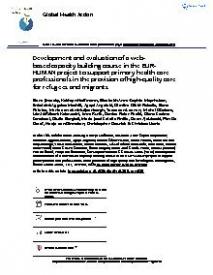Development and evaluation of a web-based capacity building course in the EUR-HUMAN project to support primary health care professionals in the provision of high-quality care for refugees and migrants
Background:
The ongoing refugee crisis has revealed the need for enhancing primary health care (PHC) professionals’ skills and training.
Objectives:
The aim was to strengthen PHC professionals in European countries in the provision of high-quality care for refugees and migrants by offering a concise modular training that was based on the needs of the refugees and PHC professionals as shown by prior research in the EUR-HUMAN project.
Methods:
We developed, piloted, and evaluated an online capacity building course of 8 stand-alone modules containing information about acute health issues of refugees, legal issues, provider–patient communication and cultural aspects of health and illness, mental health, sexual and reproductive health, child health, chronic diseases, health promotion, and prevention. The English course template was translated into seven languages and adapted to the local contexts of six countries. Pre- and post-completion knowledge tests were administered to effectively assess the progress and knowledge increase of participants so as to issue CME certificates. An online evaluation survey post completion was used to assess the acceptability and practicability of the course from the participant perspective. These data were analyzed descriptively.
Results:
A total of 390 participants registered for the online course in 6 countries with 175 completing all modules of the course, 47.7 % of them medical doctors. The mean time for completion was 10.77 hours. In total, 123 participants completed the online evaluation survey; the modules on acute health needs, legal issues (both 44.1%), and provider–patient communication/cultural issues (52.9%) were found particularly important for the daily practice. A majority expressed a will to promote the online course among their peers.
Conclusion:
This course is a promising learning tool for PHC professionals and when relevant supportive conditions are met. The course has the potential to empower PHC professionals in their work with refugees and other migrants.
In: Global Health Action, ISSN 1654-9716; eISSN 1654-9880 | 11 | 1 | 1547080
https://doi.org/10.1080/16549716.2018.1547080


